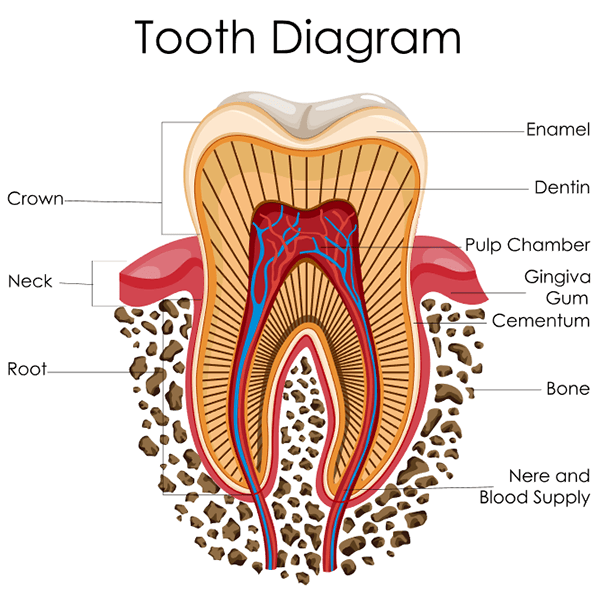Do you ever experience sharp pain, almost like a lightning bolt hit your tooth, when drinking a cold beverage, eating ice cream, or when breathing in cold air? Maybe sweet, sour, or hot food and beverages cause discomfort? Or even brushing and flossing gives you a zinger? If any of these sound familiar to you, you aren’t alone. It is estimated that 57% of people experience sensitive teeth1. So what is the cause of tooth sensitivity?
To discuss causes, we first must understand the basics of tooth structure. The crown of a tooth, the part above the gumline, is covered with enamel. Enamel is the hardest substance in your body. The root of a tooth isn’t covered with enamel, but with cementum. Cementum is “softer,” or less calcified than enamel. Below the outside protective layers of the enamel of the tooth crown and cementum of the tooth root, is dentin. Dentin is filled with tiny tubules, like tunnels, with microscopic nerve endings that extend to the inner portion of the tooth, the pulp. The pulp chamber contains larger nerves and blood vessels.

Now that we have covered the basics of tooth structure, on to tooth sensitivity! While there isn’t a one size fits all answer to what may be causing your tooth sensitivity, here are five possible culprits.
Gum disease
Your mouth is filled with bacteria, some of which can cause infection and disease if not removed by brushing and cleaning in between your teeth regularly and properly. Gingivitis, which causes red, inflamed (puffy), and bleeding gums, can be reversed with proper oral care and treatment. However, if gingivitis is not treated, and disease-causing bacteria become stronger, it can lead to a more serious type of gum disease called periodontitis. Periodontitis is more serious because the tissues (bone, ligaments, and gum tissue) that hold your teeth in place are broken down and destroyed, and they don’t grow back.
When gum tissue is broken down and recedes, it exposes the roots of your teeth. Considering that roots are protected and covered by less-calcified cementum, as opposed to enamel, thermal (hot or cold), chemical (sweet or sour), or tactile (brushing and flossing) stimuli can aggravate nerves. This aggravation or stimulation of nerves can lead to sensitive teeth and give you a zinger of pain.
Besides the pain of sensitive teeth from gum recession due to infection, infection in your mouth can affect whole body health. Disease and inflammation-causing bacteria from the mouth have been linked to a higher risk of heart disease, stroke, certain cancers, and the list goes on. If your gums bleed when you brush or floss or you just haven’t kept regular dental appointments, it’s never too late to get your health back on track.
Brushing technique
On the other end of the spectrum of not brushing enough, leading to disease and gum recession, is brushing using an improper and damaging technique. This can include brushing aggressively with too much force, brushing side-to-side in a scrub-like motion with the brush horizontally toward the teeth, or using a medium or hard bristled toothbrush. Using abrasive toothpaste can cause issues as well.
When brushing, the goal should be to remove plaque and bacteria, not to wear away enamel or traumatize gum tissue. As enamel wears away or abrades, it exposes the underlying dentin, which can cause tooth sensitivity. Improper brushing technique can also traumatize and abrade gum tissue possibly leading to gum recession. As mentioned before, as gum tissue recedes, it exposes sensitive root surfaces which can lead to tooth sensitivity.
When brushing it’s important to use a soft-bristled toothbrush, brushing with short, light strokes, and holding the brush so the bristles are at a 45-degree angle to your gum line. Your dental hygienist is the go-to dental professional for educating on correct brushing technique.
Dental erosion from acidic food and beverages
Even though enamel is the strongest substance in your body, it can still be broken down. This can be seen when the acids produced by bacteria cause dental decay (cavities) and when dental abrasion occurs from aggressive or improper brushing technique. Another cause of enamel erosion, in which exposes underlying, nerve-filled dentin, can happen from the frequent consumption acidic food and beverages. GERD and acid reflux can cause erosion of your enamel as well.
Sipping on acidic drinks, such as soda, coffee, juice, and energy drinks, or snacking on acidic foods, can break down or demineralize tooth enamel. Even healthy foods such as grapes, plums, pomegranates, grapefruit, blueberries, pineapple, peaches, apples, oranges, tomatoes, and mangoes, have an acidic pH. As enamel breaks down, it can expose the underlying dentin layer, which can cause tooth sensitivity. If you have gum recession, exposed root surfaces can be aggravated by acids, potentially causing sensitivity as well.
When eating or drinking acidic beverages or foods, it’s best to do so in one sitting, instead of consuming them slowly, over a long period of time. Drinking acidic beverages while eating can help lessen the amount of acid bathing your teeth. Using a straw can also lower the amount of acids bathing your teeth. Also, wait to brush your teeth after eating or drinking acidic foods or beverages for 20-40 minutes, so your saliva has time to neutralize your mouth to avoid brushing the acid around.
Grinding and clenching your teeth
If you aren’t eating while you are reading this, take a moment to focus on your mouth and the position of your jaw. Are your teeth touching, or occluding, or is there a space in between your teeth? I hope you answered your teeth aren’t touching, and there’s some space in between the chewing surfaces of your teeth. Teeth should only touch, or occlude, about 15 minutes per day when eating or swallowing. When not eating or swallowing, and your mouth is at “rest position,” your teeth should be apart by about 2-4mm.
If your teeth are clenched together, the excessive force placed on your teeth and supporting structures of your teeth can possibly lead to gum recession and wear down your enamel. Both of which can lead to sensitivity. Again, gum recession exposes less calcified cementum, which makes it easier to aggravate nerves of the dentin below. With the loss of enamel, nerve-filled dentin can be exposed, leading to possible sensitivity.
Sometimes, clinching or grinding only happens while you are sleeping. For this, your dentist can make a custom night guard to protect your teeth. A night guard can also help take some force off your teeth and supporting structures of your teeth, like a cushion. If you clench all of the time, seeking out treatment from specialists, such as a myofunctional therapist, who can work with you to attain proper oral rest position.
Aging
Aging is a part of life. As we age, skin loses elasticity and wrinkles form and hair may thin and turn gray. Just as a body endures wear and tear over the years, so do your teeth. Wear and tear over the years, whether you have good or bad habits, can lead to the thinning of enamel. When enamel thins, dentin can be exposed. As you’ve probably learned by now, exposed nerve-filled dentin can lead to sensitivity.
What should you do if you are experiencing tooth sensitivity?
If you are experiencing any tooth sensitivity or pain, it is important to let your dental hygienist or dentist know what you are feeling. Tooth sensitivity can be mistaken for problems that need treatment sooner than later to avoid even bigger problems, such as:
- Severe decay (cavity) that has reached the pulp of your tooth, in which you may not even see if it’s in between your teeth
- Recurrent decay around a previously placed filling or crown
- A filling that may be breaking down and in need of replacement
- Fractured or cracked tooth or root
- Infected gums
- Abscessed tooth
It’s also important to let your dental hygienist or dentist know about your sensitivity because they can help alleviate the pain. Depending on the cause of your sensitivity, your dental professional can:
- Recommend an over-the-counter sensitivity toothpaste and explain how to use it (Consistency is key!)
- Provide in-office fluoride treatments
- Recommend a prescription strength fluoride toothpaste
- Polish your teeth with a desensitizing paste
- Fabricate take-home trays for fluoride or desensitizing paste
- Apply an in-office treatment of desensitizer on exposed root surfaces
- Fabricate a custom night guard for clinching and grinding
- Refer you to a specialist based on your individual needs
There are more causes of tooth sensitivity than listed here, however, regardless of the cause, it is so very important to speak to your dental professional about any discomfort you are experiencing. Without knowing, they cannot discover the cause, treat based on the cause, and get you out of discomfort and pain so that you can enjoy ice cream again!
NOW READ: Getting Down to It: Gingival Recession and Sensitivity
DON’T MISS: Ask Kara RDH: Patient with Severe Sensitivity when Scaling
References
- Splieth, C.H., Tachou, A. Epidemiology of Dentin Hypersensitivity. Clin Oral Investig. 2013 Mar; 17(Suppl 1): 3–8. Retrieved from https://www.ncbi.nlm.nih.gov/pmc/articles/PMC3585833/.











